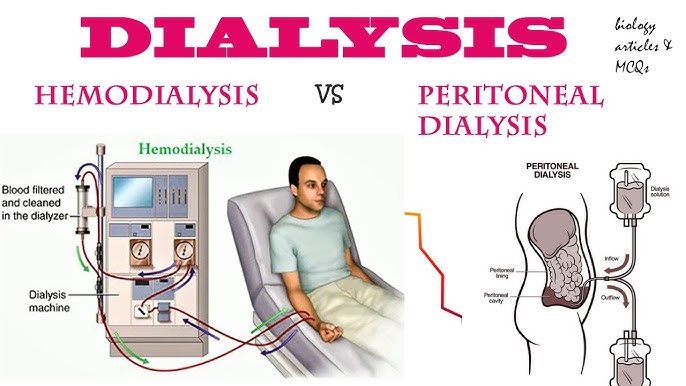Dialysis Treatment in India: Ensuring Lifelong Care for Kidney Patients
Dialysis is a medical treatment that helps replace the function of the kidneys when they are no longer able to adequately filter waste products from the blood. There are two primary types of dialysis:
- Hemodialysis
- Peritoneal Dialysis
India offers world-class dialysis treatment at an affordable cost, with expert nephrologists and advanced medical facilities ensuring effective management of kidney disease. Healtour Solutions connects patients with top hospitals and dialysis centers, offering comprehensive care for all dialysis-related needs.
Types of Dialysis Available in India
- Hemodialysis
- Definition: Hemodialysis is a process that uses a machine to filter waste products, excess fluids, and toxins from the blood when the kidneys are no longer functioning properly.
- Procedure: During the procedure, blood is drawn from the body, passed through a dialysis machine, cleaned, and then returned to the body. It typically takes about 3-5 hours per session, and most patients undergo treatment 3-4 times a week.
- Advantages: Hemodialysis is highly effective at cleaning the blood and is commonly used in patients with end-stage kidney failure.
- Peritoneal Dialysis
- Definition: Peritoneal dialysis involves using the lining of the abdomen (peritoneum) as a natural filter to remove waste products and excess fluid from the blood.
- Procedure: A catheter is placed in the abdomen, and a special fluid (dialysate) is introduced into the peritoneal cavity. Waste products and fluids are then drawn from the blood into the dialysate, which is later drained out and replaced with fresh fluid.
- Advantages: Peritoneal dialysis can be done at home, offers more flexibility, and may be more suitable for patients with specific health conditions that make hemodialysis less ideal.
Why Choose Dialysis Treatment in India?
- Affordable Care: Dialysis treatment in India is significantly more affordable compared to many Western countries, making it a popular destination for medical tourists seeking quality dialysis at lower costs.
- Expert Nephrologists: India is home to some of the world’s leading nephrologists, offering expertise in both hemodialysis and peritoneal dialysis.
- State-of-the-Art Facilities: Indian hospitals and dialysis centers are equipped with the latest technologies and facilities, ensuring that patients receive the highest standard of care.
- Personalized Care Plans: Healtour Solutions works with top medical institutions to offer customized dialysis treatment plans based on individual health needs, ensuring the best possible outcomes for patients.
- Easy Access to Dialysis: With numerous dialysis centers across India, patients can easily find convenient access to regular dialysis treatment.
Hemodialysis Procedure in India
- Initial Consultation and Evaluation:
The first step involves a consultation with a nephrologist who evaluates the patient's kidney function, medical history, and general health. Tests are conducted to determine whether hemodialysis is the most suitable option.
- Fistula or Catheter Placement:
For hemodialysis, a vascular access point (fistula or catheter) is created to facilitate the withdrawal and return of blood. This is typically done a few weeks before the first dialysis session to allow healing.
- Dialysis Sessions:
During hemodialysis, the patient is connected to a dialysis machine through the fistula or catheter, and the blood is filtered to remove waste and excess fluid. Each session lasts about 3-5 hours, and patients usually require 3-4 sessions per week.
- Post-Dialysis Monitoring:
After each session, the patient is monitored for any potential side effects, such as low blood pressure or fatigue. The nephrologist ensures that the patient’s body is responding well to the treatment.
Peritoneal Dialysis Procedure in India
- Initial Consultation and Evaluation:
Similar to hemodialysis, the first step is to consult with a nephrologist, who will assess the patient's overall health and suitability for peritoneal dialysis. Diagnostic tests will also be conducted.
- Catheter Insertion:
A catheter is surgically placed into the peritoneal cavity, typically under local anesthesia. This catheter allows the dialysate fluid to be introduced and drained from the abdomen during dialysis.
- Dialysis at Home or Clinic:
Peritoneal dialysis can be performed at home after proper training. The patient fills the peritoneal cavity with dialysis fluid, waits for a few hours to allow waste and excess fluid to be absorbed, and then drains the fluid.
- Ongoing Monitoring:
Regular follow-up visits are required to ensure that the peritoneal dialysis is working effectively. The patient is monitored for any complications such as infections (peritonitis) or poor dialysis efficiency.
Benefits of Dialysis Treatment in India
- Expert Care: India’s nephrologists are well-trained and experienced, offering expert care for patients undergoing dialysis treatment.
- Cutting-Edge Technology: Dialysis centers and hospitals in India are equipped with the latest medical technology, ensuring accurate treatment and optimal results.
- Cost-Effective Treatment: The cost of dialysis in India is much lower compared to many other countries, making it an ideal choice for patients seeking affordable treatment options.
- Comfort and Support: Indian hospitals provide a comfortable and supportive environment for dialysis patients, with dedicated care teams to assist with every aspect of the treatment process.
Post-Dialysis Care and Follow-Up
After undergoing dialysis treatment, patients require regular follow-up visits to monitor kidney function, dialysis efficacy, and overall health. Key aspects of post-dialysis care include:
- Monitoring for complications such as low blood pressure, infection, or muscle cramps.
- Managing medications to avoid fluid overload or other complications.
- Ensuring adherence to dietary and fluid intake recommendations.
- Regular check-ups to assess kidney health and determine if changes to the dialysis plan are needed.
Why Choose Healtour Solutions for Dialysis Treatment in India?
- Access to Leading Nephrologists: Healtour Solutions works with some of the best nephrologists in India, ensuring expert guidance throughout the dialysis process.
- State-of-the-Art Medical Facilities: We partner with renowned hospitals and dialysis centers that are equipped with cutting-edge technology for effective dialysis treatment.
- Comprehensive Patient Support: We offer full support throughout the entire dialysis journey, from initial consultation to post-treatment care.
- Cost-Effective Treatment: Healtour Solutions ensures that international patients receive affordable dialysis treatment with no compromise on quality.
- Seamless Experience: From travel arrangements to hospital visits, Healtour Solutions provides comprehensive assistance, making your medical tourism experience smooth and stress-free.
Contact Us for Dialysis Treatment in India
If you or a loved one requires hemodialysis or peritoneal dialysis, Healtour Solutions can help connect you with the best dialysis centers and nephrologists in India. Our personalized services ensure that you receive high-quality, affordable care throughout your dialysis treatment journey.
FAQs About Dialysis
1. What is dialysis?
Dialysis is a medical procedure that replaces kidney function in patients with kidney failure. It helps filter waste, excess fluid, and toxins from the blood.
2. What is the difference between hemodialysis and peritoneal dialysis?
Hemodialysis uses an external machine to filter blood, while peritoneal dialysis uses the peritoneal membrane inside the abdomen to filter waste products.
3. How often do I need dialysis?
Hemodialysis typically requires 3-4 sessions per week, while peritoneal dialysis is usually done every day, with a few hours of treatment each session.
4. Is dialysis a permanent solution?
Dialysis is a life-sustaining treatment, but it is not a permanent cure for kidney disease. In some cases, a kidney transplant may be needed.
5. Can I travel while on dialysis?
Yes, many dialysis patients can travel. Healtour Solutions assists with finding dialysis centers in different locations to ensure you receive treatment wherever you go.
6. How long does a dialysis session last?
A typical hemodialysis session lasts 3-5 hours, while peritoneal dialysis sessions can last several hours but can be performed at home.
7. Are there any risks associated with dialysis?
While dialysis is generally safe, it can carry risks such as infection, low blood pressure, and electrolyte imbalances.
8. Can I continue working while on dialysis?
Many patients can continue working and leading a normal life with dialysis, although the frequency and duration of treatment may affect their daily routine.
9. How much does dialysis cost in India?
The cost of dialysis in India is significantly lower than in many Western countries, with hemodialysis costing around $30-$50 per session.
10. How can Healtour Solutions assist with dialysis treatment?
We provide access to leading nephrologists and dialysis centers in India, along with complete support for travel, accommodation, and medical care throughout your treatment journey.




